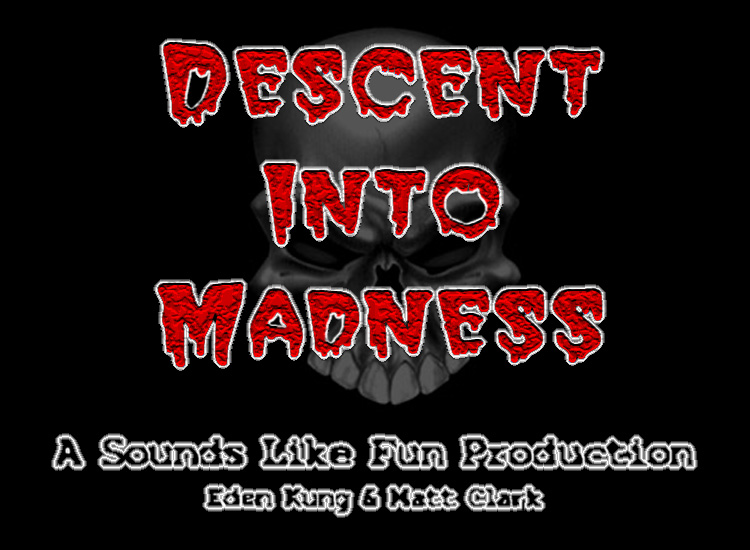SoundsLikeFun
by Matt Clark and Eden Kung


Descent into Madness
Sounds Like Fun is proud to present its second game, Descent into Madness, a horror-themed adventure game made accessible for visually-impaired people.
You can download an installer here.
Brandon Werner has ported the game to PyGame. You can find it on Github.

Why Are We Doing This?
The entertainment industry is primarily geared for sighted people. TV, movies, and video games are all visually-focused, leaving blind kids out of the loop. Some blind kids play Grand Theft Auto using only sound and the rumble pad. Think about how frustrating that must be! But they are eager to play so they suffer through it. There are not many after-school activities available for kids with impaired vision, so they play games intended for sighted kids by trial and error.
However, with some creativity, we can easily create sound-based games for blind kids. Better yet, we can also make these games fun for both blind and sighted kids alike. That way, they can play together and interact.
The Game
Story
You awaken one day to find that you have been kidnapped! Starting with no idea where you are, you slowly piece together clues that you have been the test subject of a scientist trying to find a cure for his wife’s maddening disease. However, the experiments have had the unforunate consequence of driving their subjects mad as well. Now it’s up to you to find a cure for yourself and escape before you experience the same fate of the 51 test subjects before you.
Gameplay
The gameplay is similar to old computer adventure games. There are three actions a player can choose:
- Move
- Use Item
- Examine
The player solves puzzles and unpieces the story through voice recordings left behind by the scientist. The only controls are the arrow keys, the space bar, and the esc key, which are all relatively easy to find for a blind user. There are no visuals – the game plays like an elaborate spoken story.
Development
Architecture
The game is being developed with a modular architecture. The main game logic requires three pieces – rooms, items, and puzzles/item interactions.
- Main Game Logic
- Rooms
- Kitchen
- Hallway
- Etc
- Items
- Ax
- Journal
- Etc
- Puzzles
- Piano puzzle
- Radio puzzle
- Etc
- Rooms
Implementation
Descent into Madness is coded entirely in the Python programming language. The modular nature of Python facilitates the addition of puzzles, rooms, and items. To integrate sounds into the game, we used PySonic, a Python wrapper for FMOD developed by Pete Parente. All of the voices in the game are our original recordings, and sound effects were obtained from various webpages that allowed free use of the sounds. To record and manipulate sounds, we used Audacity, a free sound editor.
User-Created Content
Our goal with a modular architecture is to allow other people to program their own stories and puzzles as well. Currently, user-created content still requires a bit of programming experience, but a secondary goal if we have time is to make user-created content easier to create through text-to-speech and scripting tools.
During our development, we found that one of the most time-consuming aspects was recording the sounds. It took us tens of hours to record the sounds, remove background noise, tweak volume levels, remove hissing, and manipulate voices for each of the 300+ sound files that we made. This kind of effort would deter many users from attempting to create their own content. Thus, we have also included PyTTS, a Python wrapper for the Microsoft Speech API developed by Pete Parente. Using text-to-speech will make content-creation much easier.
Timeline
Descent into Madness is slated for an early May release. It will be available for download from this website at that time.
Maze Day
On April 27, 2005, visually-impaired students from across the state visited the first annual “Maze Day” event at UNC. Computer projects specifically designed for these students were on display and available for demo. The day was a huge success as both kids and adults were able to try out games, mazes, and programs catered to their needs. Sounds Like Fun had a booth set up with two computers available to test Descent into Madness. Throughout the day, stopped by to play our demo version of the game. Each person told us that they really enjoyed it and wanted to know when it would be released! It was very gratifying to see that the kids had fun with the game, which was the whole point of designing the game in the first place. We also received valuable feedback and suggestions on how to improve gameplay, and we feel that the game is a better product as a result of these comments.
Additional Info
Sonic Zoom
Our previous game, Sonic Zoom, can be found here The feedback we received regarding Sonic Zoom provided the inspiration for creating Descent into Madness.